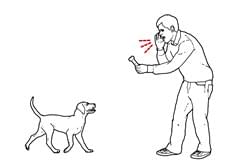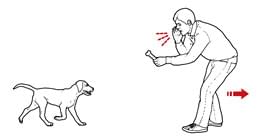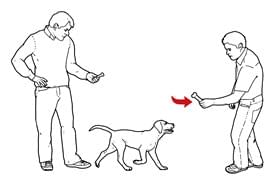Getting your dog well trained can help establish a rewarding relationship. It’s also crucial for their safety. Pet behaviourist Claire Hargrave offers her top tips.
Be consistent
Your dog needs to learn that you are the key to all the resources he or she needs – and that cooperation with you is the way to get ahead.
At times it will be very tempting to treat your puppy like a baby but this will only increase dependency and reduce his or her competency.
Teaching your dog to walk on a lead
Drop tiny treats from your hip alongside your foot as you go with the puppy following you on the lead. Start off on grass or carpet – if you do this on lino or concrete the treats will bounce. Make sure you drop the treats in quick succession so your puppy doesn’t eat the treat and wander off.
When you start to introduce the puppy to different kinds of environments, take it slowly. Be sensitive to the signals your pet gives when he or she is starting not to cope, such as putting their ears back, blinking, licking his or her nose or lips, panting or raising a paw.
If your pup’s not coping, take them back to a place they can relax.
Don’t overtask your puppy
Remember that puppies only have a small window of concentration so do your training in short bursts of three minutes at a time, several times a day, in different locations around the house and garden.
Do a few little exercises at a time. And if your pup doesn’t understand, take him or her back to something they can do.
However, once you have taught your dog a skill or behaviour, it’s essential to keep your approach consistent.
Nail the chewing
Puppies mouth (chew things) because they are investigating the environment. Therefore it’s critical that you manage this.
Provide a range of toys to chew so your dog doesn’t need to seek these out (and end up chewing something harmful that could get stuck in their throat). Change these every few days to keep your dog stimulated.
If your dog is mouthing everything in sight (such as your pyjama bottoms in the morning) then rather than make a noise and excite or frighten your pup, offer a replacement distraction.
And remember that if you don’t want your dog to chew your shoes, then don’t give old shoes as toys!
Don’t punish
Don’t set your dog up to fail. Reward his or her good behaviour rather than punishing bad behaviour.
If your training session isn’t going well, help your pup to engage in an activity he or she is going to succeed at. This might be a simple obedience exercise that the pup already knows, such as ‘sit’, which finishes the session on a positive note. Then think about why your pup found it difficult to learn the new skill you were attempting – was there too much going on, was he or she tired? Try again later but go very slowly!
How to recall your dog
Dogs of all ages have a tendency to think being off the lead means a completely free rein so it’s crucial that your dog learns to come back when called. This vital skill will help avoid accidents such as your dog running into the road or other dangerous places.
- Keep it simple. Call your dog’s name and offer a small treat when he or she comes. Don’t wait until your pup is sitting down or you will be rewarding the sitting.

- Repeat the exercise, taking a few steps back each time, until you are quite a distance away. Remember to keep the treats coming and reward on arrival.

- Get a friend or family member involved. Stand 10 meters apart and take it in turns to call your dog to you, each time offering a small reward. (The more exciting and distracting the environment, the more you might need to increase the reward.)

